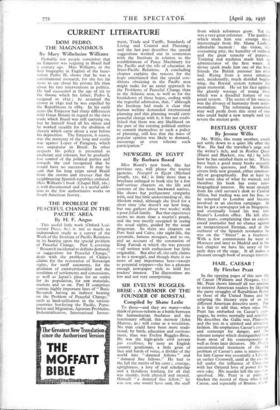CURRENT LITERATURE
DOM PEDRO, THE MAGNANIMOUS By Mary Wilhelmine Williams
Probably few people remember that an Emperor was reigning in Brazil half 'a century ago. Miss Williams, in the 'first biography in English of the bene- volent Pedro II, shows that he was a constitutional monarch, for she has far more to say about his private life than about his rare interventions in politics. He had succeeded at the age of six to the throne which his father, Pedro I, resigned in 1831 ' - he assumed the crown in 184.0 and he was expelled by .the Republicans in 1889. In his early years the Emperor had sharp differences with Great Britain in regard to the slave trade which Brazil was still carrying on, but he himself freed all his slaves and he worked steadily for the abolition of slavery which came about a year before his deposition. The Emperor, it seems, • was the mainstay of the long and costly war against Lopez of Paraguay, which was unpopular in Brazil. In other respects his policy is presented as moderate and tolerant, but he gradually lost control of the political parties and towards the end recognised that he would have no successor. It may be said that his long reign saved Brazil from the storms and stresses that the neighbouring Spanish republics endured. Miss Williams's book (Chapel Hill, i6s.) is well documented and is a useful addi- tion to the few authoritative works on South American history.


























































 Previous page
Previous page